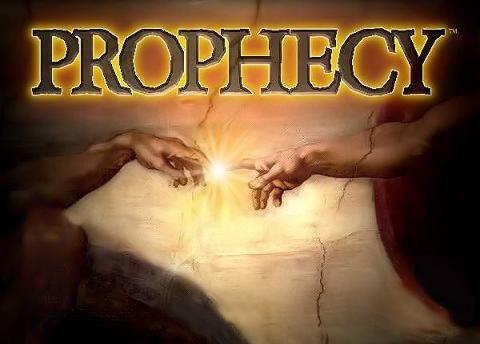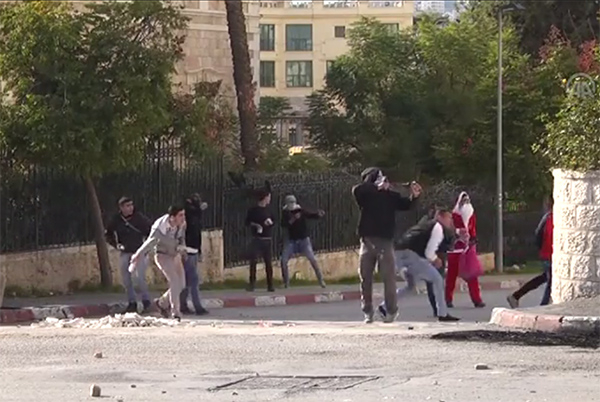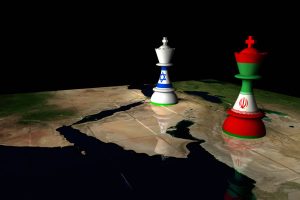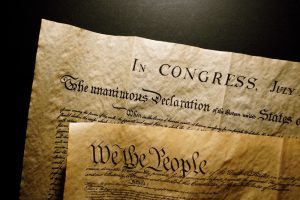If there is one question that most concerns the public around the question of radical Islam it is “What is the connection between the extremists and the moderates?” Leading politicians across the Western world have not been much help in answering this question, insisting as they do, that radical Islam has nothing to do with Islam and that the extremists are as far away from the moderates as it is possible to be. Yet the public senses that this is not the case.
Despite the amazing lack of public debate about the actual contours of the discussion, the public knows that something is not right about the analysis provided by Liberal politicians and others. Indeed, the public notices not only that there is some connection between the two (something Democrats in the U.S., among others, deny) but that the connection may be closer than anyone would like. A fine example of this was thrown up in the UK this week in the space of just 24 hours.
On Friday the London Evening Standard carried a story about the police launching a possible “hate crime” investigation into literature that the paper had discovered being handed out at a London mosque. The potential “hate crime” was not even the best known variety — a mean Tweet or a nasty comment — but the sort of thing we used to call “incitement.” The literature being handed out at a mosque in Walthamstow consisted of a booklet which insisted that “any Muslim should kill” anyone who insults the Prophet of Islam. Those who insult the main man “must be killed,” it repeated.
The pamphlet backed up this point of view with reference to classical Islamic law and explained that in the case of those who “insult” Mohammed, such as apostates who “deserve to be assassinated,” it was not necessary to wait for any court or court judgement to rule. Better just to get on with it on your own, was the gist.
In a case that is becoming increasingly familiar to indigenous British people as much as it is to British Pakistanis, the booklet referred to the seminal case of Mumtaz Qadri, the Pakistani man who in 2011 murdered Salman Taseer, the governor of Pakistan’s Punjab province. Qadri murdered Taseer because of the latter’s support for the reform of Pakistan’s strict Islamic blasphemy laws. The booklet explains that “all Muslims should support” the assassin Qadri and that even being what the publication calls “a big shot” like Taseer should not protect someone from being killed by any Muslim who feels like it.

Salman Taseer, pictured in the memorial poster at left, was the governor of Pakistan’s Punjab province when he was murdered in 2011 by a radical Islamist, because of Taseer’s support for the reform of Pakistan’s strict Islamic blasphemy laws. Right: London police may be launching a “hate crime” investigation into a booklet being handed out at a London mosque, which explains that “all Muslims should support” Taseer’s murderer. |
The police are currently investigating the Dar-ul-Uloom Qadria Jilania mosque in Walthamstow, where the booklet was handed out, and would do well to look into the imam of the mosque, Syed Abdul Qadir Jilani, whose name and photograph are on the front of the booklet in question. Of course, the response of the political class in Britain is to ignore any and all such things. “Bad egg” or “one rotten apple” is probably the most the public will be able to expect from any politician, if one were forced to give any view at all on Mr Jilani, his pamphlet or his mosque. Yet the public reads stories like this and rightly wonders where people like Mr Jilani get their ideas from and how widely such ideas might be spread.
The following day (Saturday) readers of The Sun were able to learn of a British celebrity gymnast, Louis Smith, who had got drunk with friends at a wedding and made a video that appeared to have come back to haunt him. As the Sun headline read, “Has he got a screw Louis? Olympic ace Louis Smith accused of mocking Islam after yelling ‘Allahu Akbar’ and pretending to pray in boozy video.” The video of drunken japery included Smith and a friend pulling a rug off a wall and shouting “Allahu Akbar” while the friend pretended to pray in a vaguely Islamic style. As the paper led the story,
“Olympics star and former Strictly Come Dancing winner Louis Smith has been accused of mocking Islam after appearing in a video with a mate drunkenly pretending to pray. The footage shows him with fellow gymnast Luke Carson yelling ‘Allahu Akbar’, an Islamic phrase meaning ‘God is the greatest’.”
It is hardly the most important news story of the year, and hardly involves any of the most important figures of our time. But the story will have been read by millions of readers and they will have noticed the reactions. First, that from a “security source” who tells the paper “Mocking religion is pretty foolish. In the case of Islam, it can also be quite a risky thing to do.” And then the paper has the obligatory quote from an alleged “moderate Muslim,” on this occasion one Mohammed Shafiq of a one-man organization called the “Ramadan Foundation.” Mr Shafiq has previously been hailed in Britain for his apparently exceptional moral courage and bravery in coming out against the mass gang-rape of children. In 2013, he stood accused of attempting to get up a lynch-mob when the reformist Muslim Maajid Nawaz tweeted out an innocuous image that Shafiq insisted was offensive to all the world’s Muslims.
Anyhow — responding to the Louis Smith drunken video, the same Mohammed Shafiq was quoted in the Sun saying of Smith: “I think he should apologise immediately. Our faith is not to be mocked, our faith is to be celebrated and I think people will be offended.” Shafiq does not explain why his faith should not be mocked. Nor does he seem to know anything about the right of free people in free countries to do or say whatever we like about Islam or any other faith whenever we feel like it. There is nothing special about Islam that means it cannot be mocked. In fact, it would be a very good thing (both for Muslims and everyone else) if it were mocked rather more. But there in that sentence is the implicit threat again. Less blatant than the threat against Maajid Nawaz, but very close indeed to the line used by the Walthamstow imam and the extremists who defend Mumtaz Qadri.
All insist that their faith “should not be mocked.” And for those who say they are moderates, and are presented as such by the press, it seems to be exceptionally useful that they do not have to be much more explicit than this. Fortunately for them, there are other people willing to do the killing in countries such as Pakistan and occasionally in the West. The rest of us — whether gymnasts on a night out or anyone else — are simply expected to have learnt this by now. But in this not-so-subtle intimidation do we not see precisely that thing which most worries the public? That despite what our politicians say, the allegedly vast chasm that separates the extremists from the “moderates” seems at times to be almost paper-thin.
Douglas Murray, British author, commentator and public affairs analyst, is based in London, England.







































